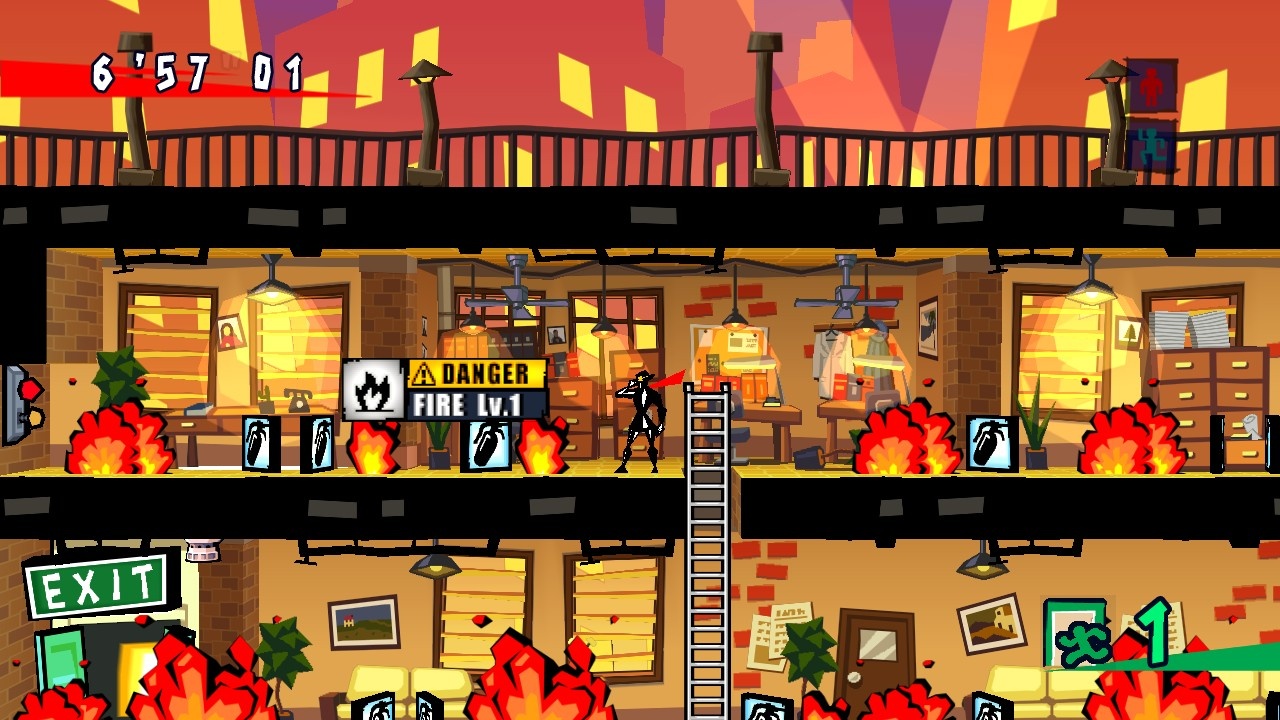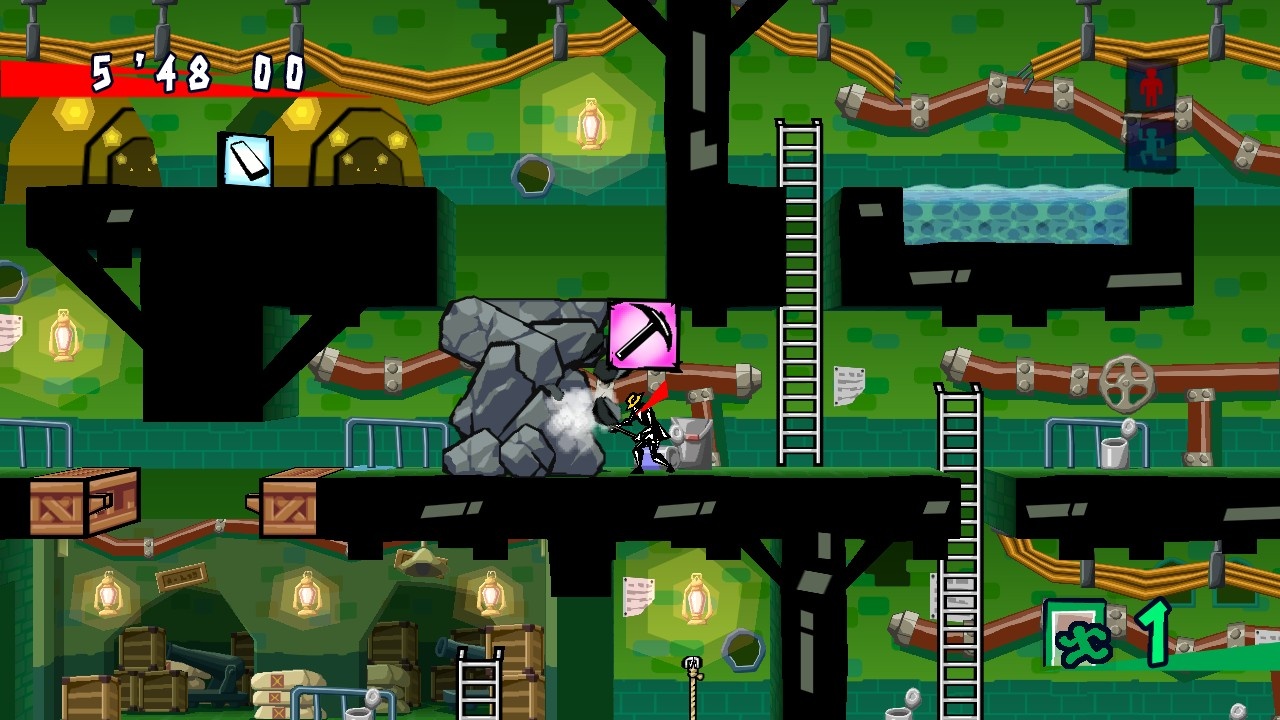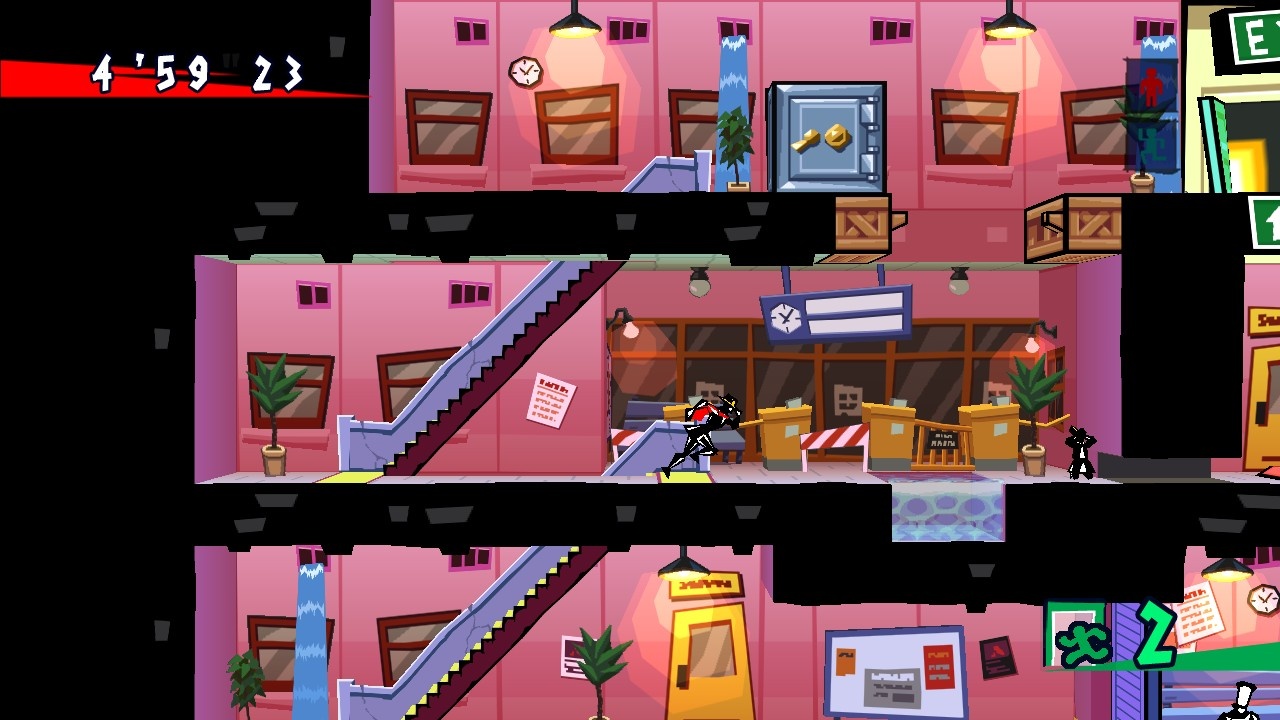Substance meets style in Exit, an engaging puzzler where a striking visual dialect and outside-the-box-of-blocks puzzle design collude to create a spirited, oft-challenging experience. Name-checking puzzle classics, such as Lemmings and the original Prince of Persia, make for convenient, fairly accurate shorthand when describing Exit, but they don't give the game due credit for the way it forges something fresh out of familiar elements. Exit was originally released on the PSP a year and a half ago, yet despite the lack of new content, it makes for a great Xbox Live Arcade game.
You play as Mr. ESC, a professional "escapologist" with a serious caffeine addiction who lends his agile frame and sharp mental faculties to paying customers in need of having people extracted from dangerous situations. Throughout the course of the game's 10 stages, you'll puzzle your way out of a burning building, a flooded mall, a quake-rattled hospital, a blacked-out underground facility, a hotel that has been hit by an avalanche, and more. Though the types of hazards you'll have to surmount can range from bare electrical floor panels to flooded caverns, your goal is always the same: Find the survivors and get them to the exit. Mr. ESC is nimble and strong, but he's not superhuman. He can run and jump across small gaps, as well as jump and pull himself up onto ledges. He can also push boxes, crawl through low passages or under clouds of smoke, and swim underwater for less than a minute. However, contact with fire, electricity, or a fall from a great height will cripple Mr. ESC instantly and end the mission. 
The survivors you'll encounter often have even greater physical limitations. There are four different types of survivors you'll encounter: young adults, grown adults, children, and the injured. Young adults are about as strong and spry as Mr. ESC, though they can't jump as far. Grown adults are stronger, which means they can move objects that Mr. ESC himself wouldn't be able to budge, but they also require assistance getting up and over higher ledges. Children can't jump far and need help getting up to or down from higher ledges, but they can traipse across surfaces that would shatter under the weight of a larger person, as well as crawl through passages that are too tight for Mr. ESC. The injured survivors are the biggest liability. They cannot move on their own, so either Mr. ESC or an adult survivor has to carry them. This severely slows them down, whether they're walking or using a rolling stretcher, which is hard to come by in the game.
There are a few somewhat arbitrary limitations. For example, survivors may be able to get into elevators on their own, but they won't be able to actually operate the elevators. However, the abilities of your survivors are a major factor in figuring your way out of a building. You can use the right analog stick and the Y button to select any survivors you've made contact with to give them destinations, as well as various tasks. Sometimes having a survivor helping you out just makes the work go faster, but in most levels, there are situations that require the talents of multiple people at once, making for some seriously devious puzzles.
When survivors are in "follow" mode, they're smart enough to avoid anything life threatening, but if you directly command them to walk into the middle of a blazing fire, they'll do it--no questions asked. They also seem to have trouble reconciling vertical and horizontal space at the same time, which means they'll sometimes get stuck when given the broad order to climb a flight of stairs. At worst, though, this just means they require a little extra babysitting.

Exit turns up the volume on the difficulty and complexity of the puzzles at a nice, steady pace. But it always requires you to be diligent and methodical because pushing a box too far or hitting a switch out of turn can leave you stuck, with no recourse but to retry the level. While precision is valuable, the game also injects the proceedings with a sense of urgency by using a countdown clock that will end the level if you don't get everyone out before it reaches zero. Though we rarely found ourselves really racing the clock, the time it takes you to exit a level will affect your overall score for that level, which we often found to be inspiration enough to be as economical with our time as possible. On a few extremely rare occasions, the game will focus on action more than puzzles, which isn't Exit's strongest suit. The controls, while responsive enough for the puzzle-solving majority of the gameplay, are a little too slow and clunky to support pure action gameplay.
Including the first 10 levels, which amount to a surprisingly comprehensive tutorial, there are 100 individual levels in Exit, which will take even the most cunning of puzzle-solvers at least 10 hours to finish. Though it doesn't include the 11 bonus stages that were made available for the PSP version of Exit at launch, there is support for downloadable content.
The puzzles are definitely engrossing and challenging on their own, while the game's playful visuals help make things feel especially original. The characters are little more than wire-frame models with some minimalist character traits. Mr. ESC is totally nondescript, save for his yellow hat and the red tie, which seems to always be blowing over his shoulder. Despite some lean designs, the people in Exit are imbued with a bit of humanity by way of smooth, realistic animations. The buildings are caricatures of modern designs and always rich with small background details, as well as little bits of cartoony flair. With its penchant for primary colors, it's hard to deny the funny-page influence in Exit, but all of its pieces come together to create an incredibly unique look. There are a few jagged edges that betray the game's handheld origins, but they're fairly isolated and not terribly distracting.

The soundtrack supports the game's urgent but good-humored nature with an upbeat fusion of break beats and jazzy melodies that occasionally have a Secret Agent Man vibe to them. Sadly, the otherwise enjoyable sound in Exit is marred by grating, plaintive voice clips from both Mr. ESC and the survivors that constantly repeat. Sometimes these voice clips are useful because survivors will let you know when they're confronted with an obstacle they cannot get past. But constant chatter about how they're hungry, cold, and want to go home doesn't help anyone.
Exit is inherently a very likable game. The premise and presentation are light and fun, without being cute or cloying. The puzzles will put your logic to the test but without being condescending or overly punishing. The puzzles stay varied and interesting, which make them a nice reprieve from the well-worn Tetris-derived puzzle games and the infuriatingly dense item-based puzzles common in adventure games. Puzzle fans will love Exit, and with its conventional side-scrolling platformer presentation, people who don't think they like puzzle games may find themselves enjoying a puzzle game without even knowing it. For 800 points ($10), it's a solid value.